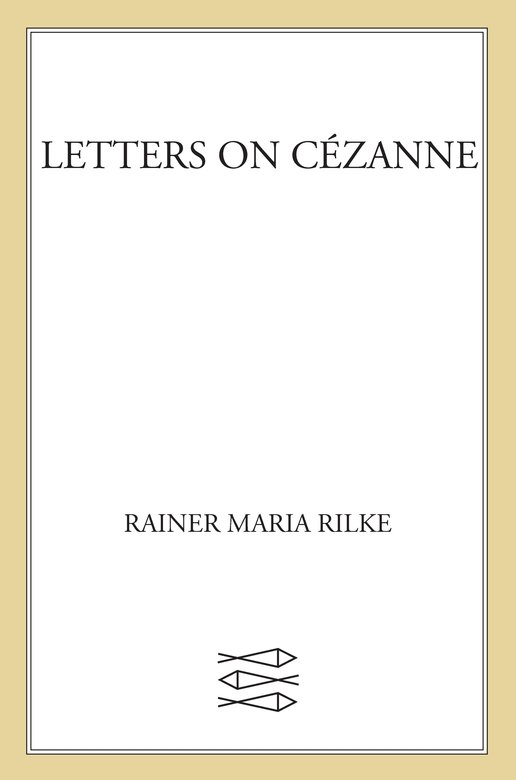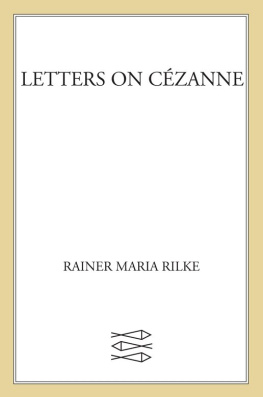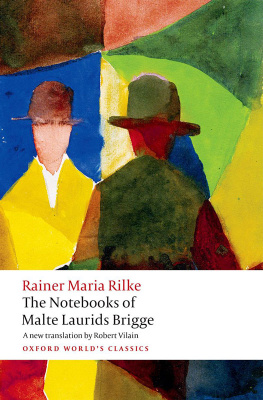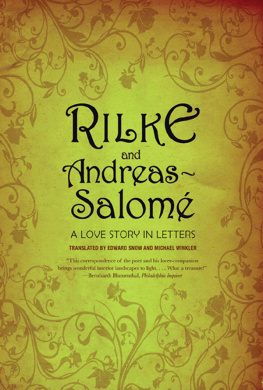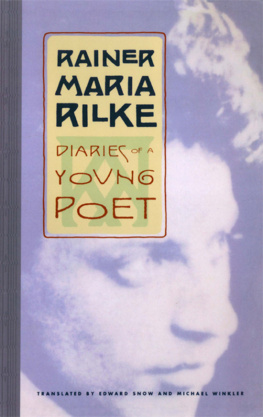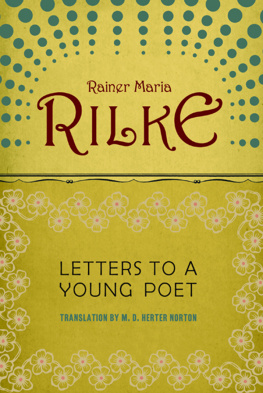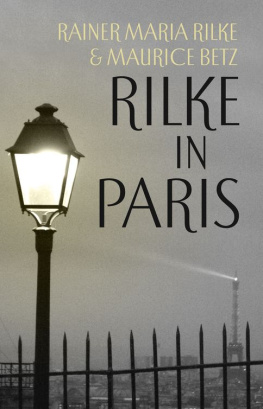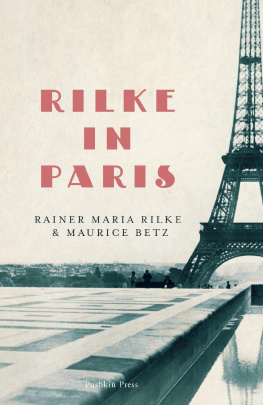RAINER MARIA RILKE was born in Prague in 1875 and traveled throughout Europe for much of his adult life, returning frequently to Paris. There he came under the influence of the sculptor Auguste Rodin and produced much of his finest work, most notably the two volumes of New Poems as well as the great modernist novel The Notebooks of Malte Laurids Brigge . Among his other books of poems are The Book of Images and The Book of Hours. He lived the last years of his life in Switzerland, where he completed his two poetic masterworks, the Duino Elegies and Sonnets to Orpheus. He died of leukemia in December 1926.
JOEL AGEE has also translated Elias Canetti, Friedrich Drrenmatt, Gottfried Benn, and another collection of Rilkes letters, Rilke and Benvenuta: An Intimate Correspondence . He won the Helen and Kurt Wolff Translators Prize for his translation of Heinrich von Kleists Penthesilea, a verse play. He is the author of Twelve Years: An American Boyhood in East Germany and lives in Brooklyn.
seeing and workinghow different they are here. Everywhere else you see, and think: later. Here theyre almost one and the same. Youre back again: thats not strange, not remarkable, not striking; its not even a celebration; for a celebration would already be an interruption. But this here takes you and goes further with you and goes with you to everything and right through everything, through small things and great. Everything that was rearranges itself, lines up in formation, as if someone were standing there giving orders; and whatever is present is utterly and urgently present, as if prostrate on its knees and praying for you
This morning your long letter, with all your thoughts After all, works of art are always the result of ones having been in danger, of having gone through an experience all the way to the end, to where no one can go any further. The further one goes, the more private, the more personal, the more singular an experience becomes, and the thing one is making is, finally, the necessary, irrepressible, and, as nearly as possible, definitive utterance of this singularity Therein lies the enormous aid the work of art brings to the life of the one who must make it,: that it is his epitome; the knot in the rosary at which his life says a prayer, the ever-returning proof to himself of his unity and genuineness, which presents itself only to him while appearing anonymous to the outside, nameless, as mere necessity, as reality, as existence.
So surely we have no choice but to test and try ourselves against the utmost, but probably we are also constrained to keep silence regarding it, to avoid sharing it, parting with it in communication before it has entered the work of art: for the utmost represents nothing other than that singularity in us which no one would or even should understand, and which must enter into the work as such, as our personal madness, so to speak, in order to find its justification in thework and show the law in it, like an inborn design that is invisible until it emerges in the transparency of the artistic. Nevertheless there are two liberties of communication, and these seem to me to be the utmost possible ones: the one that occurs face-to-face with the accomplished thing, and the one that takes place within actual daily life, in showing one another what one has become through ones work and thereby supporting and helping and (in the humble sense of the word) admiring one another. But in either case one must show results, and it is not lack of trust or withdrawal or rejection if one doesnt present to another the tools of ones progress, which have so much about them that is confusing and tortuous, and whose only value lies in the personal use one makes of them. I often think to myself what madness it would have been for van Gogh, the comrade hed longed for, the kindred spirit, arrive than he had to cut off his ear in despair,after they had both determined to hate one another and at the first opportunity get rid of each other for good. (But thats just one side of it: feeling this from artist to artist. Another side is the woman and her part in it.) And a third (but only conceivable as a test for the upper grades) is the complication of the woman being an artist. Ah, that is an altogether new question, and ideas start nibbling at you from all sides as soon as you take just a few steps in their direction. I wont say any more about this today.
I must keep a steady course so long as the second part of my Rodin book isnt written yet. While Im doing it, certain shifts of perspective must not be allowed to play a part as yet; they would destroy a great deal that was of a simple order, but they would still not feel sufficiently familiar to me to allow a new and equally clear and, in the deepest sense, right relation of insights to arise. Naturally this second part will be the already existing lecture, virtually or completely unchangedfor in no way is this the time to say something new about Rodin. Instead, I must let the lecture stand as it is while I get it ready for the printer. I can still understand it completely, I think, although by now Im beginning to understand that many perceptions in it may possibly be a response to the standards Rodin taught us to apply, rather than to the standards his work meets from case to case. I dont know anything about this yet; and that Rodin does not think about his work but remains within it: within the attainablethat is just what we felt made him so exceptional, this humble, patient path he trod through the real: and I have not yet found another faith to replacethis one. In art, you can only stay within the well done, and by your staying there, it increases and surpasses you again and again. It seems to me that the ultimate intuitions and insights will only approach one who lives in his work and remains there, and whoever considers them from afar gains no power over them. But all that already belongs in the area of personal solutions. Basically its none of our business how somebody manages to grow, if only he does grow, if only were on the trail of the law of our own growth
Never have I been so touched and almost moved by the sight of heather as the other day, when I found these three branches in your dear letter. Since then they have been lying in my Book of Images, penetrating it with their strong and serious smell, which is really just the fragrance of autumn earth. But how glorious it is, this fragrance. At no other time, it seems to me, does the earth let itself be inhaled in one smell, the ripe earth; in a smell that is in no way inferior to the smell of the sea, bitter where it borders on taste, and more than honeysweet where you feel it is close to touching the first sounds. Containing depth within itself, darkness, something of the grave almost, and yet again wind; tar and turpentine and Ceylon tea. Serious and lowly like the smell of a begging monk and yet again hearty and resinous like precious incense. And the way they look: like embroidery, splendid; like three cypresses woven into a Persian rug with violet silk (a violet of such vehement moistness, as if it were the complementary color of the sun). You should see this. I dont believe these little twigs could have been as beautiful when you sent them: otherwise you would have expressed some astonishment about them. Right now one of them happens to be lying on dark-blue velvet in an old pen-and-pencil box. Its like a firework:well, no, its really like a Persian rug. Are all these millions of little branches really so wonderfully wrought? Just look at the radiance of this green which contains a little gold, and the sandalwood warmth of the brown in the little stems, and that fissure with its new, fresh, inner barely-green. Ah, Ive been admiring the splendor of these little fragments for days and am truly ashamed that I was not happy when I was permitted to walk about in a superabundance of these. One lives so badly, because one always comes into the present unfinished, unable, distracted. I cannot think back on any time of my life without such reproaches and worse. I believe that the only time I lived without loss were the ten days after Ruths birth, when I found reality as indescribable, down to its smallest details, as it surely always is.But presumably I would not be so receptive to the splendor of these little pieces of heather stemming from the extravagance of the northern year if I hadnt just gotten over an urban summer. Perhaps, then, it wasnt completely in vain that I lived through the sort of cubicled summer where youre lodged as if in the smallest of those boxes that fit one into the other, twenty times. And youre sitting in the last one, crouching. Good God: how I labored last year; oceans, parks, woods, forest meadows: my longing for these is indescribable sometimes. Now that winters already impending here. Those vaporous mornings and eveningsare already starting, where the sun is merely the place where the sun used to be, and where in the yards all the summer flowers, the dahlias and the tall gladiolas and the long rows of geraniums shout the contradiction of their red into the mist. This makes me sad. It brings up desolate memories, one doesnt know why: as if the music of the urban summer were ending in dissonance, in a mutiny of all its notes; perhaps just because one has already once before taken all this so deeply into oneself and read its meanings and made it part of oneself, without ever actually making it.
